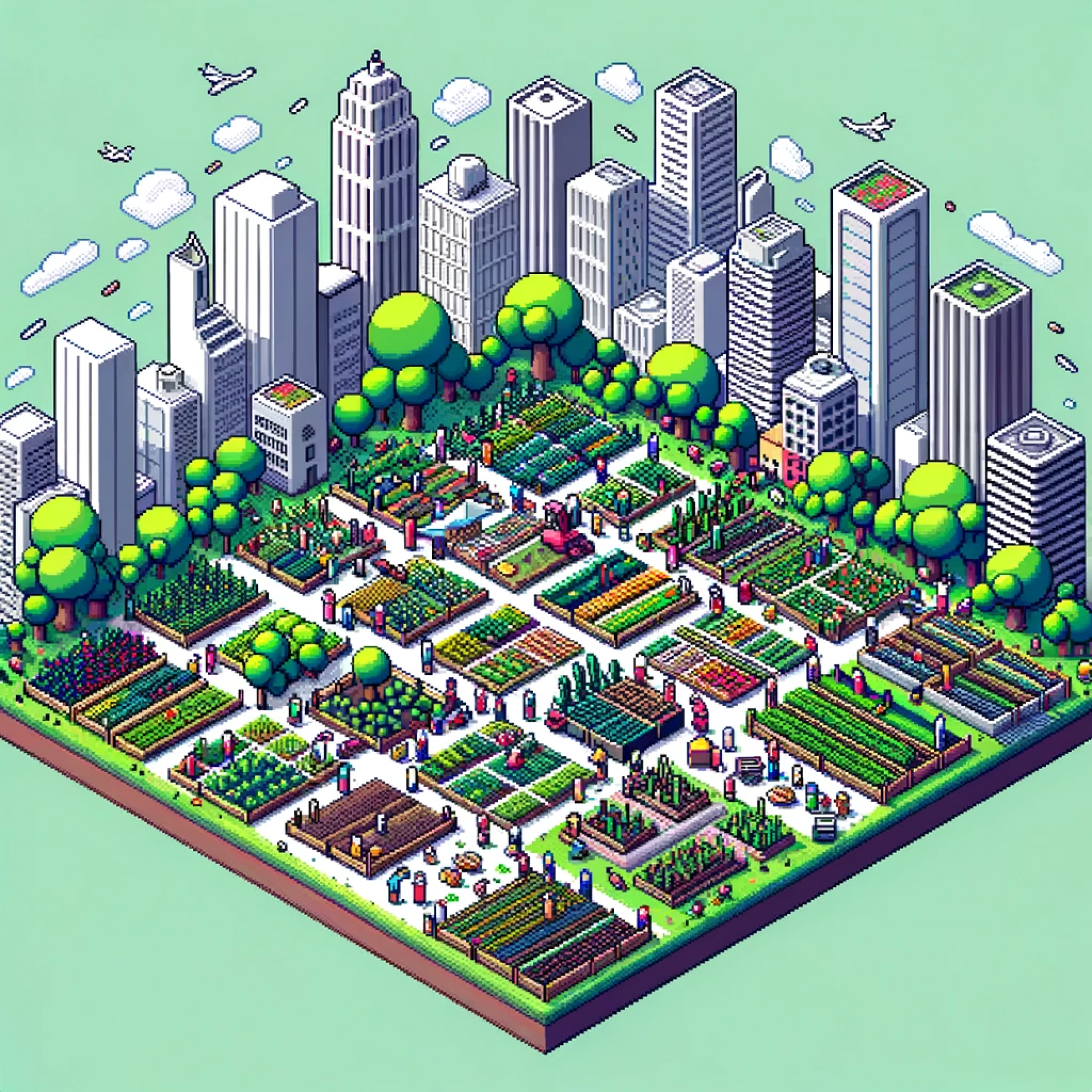Moving Feasts
Imagine if Greater Melbourne was a central part of a fair, connected and regenerative Victorian food system.
By

A retro video game impression of inner-city agriculture in Melbourne
Food is the great connector between diverse groups of human beings, and between us and our natural ecosystem. There is perhaps no greater way to feel a sense of interconnectedness than when we share a fresh meal, surrounded by people we love.
Food is also an intuitive gateway to a more systemic understanding of the world around us. When we bite down on a delicious mouthful of pasta, we can pause and imagine what a thriving food system should look like. Farmers growing fresh food, being paid fairly for their work. A sustainable transport sector moving fresh food across the country. Purpose-driven organisations creating delicious and healthy food products of all kinds. Distribution businesses transporting food and food products to a diverse set of restaurants, cafes, shops and supermarkets, providing access to fresh and nutritious food reliably and at accessible prices.
And yet, our current food system doesn’t look like this. Far from it in fact. As Moving Feast points out, we have a plethora of challenges in Victoria including (Moving Feast, 2021; Donati & Rose, 2022):
- Loss of abundant First Nations food-bowls and lack of recognition and respect for traditional owners, and Indigenous foods and food system knowledge;
- Broadscale agricultural production and urban sprawl stripping arable land for sustainable production;
- Small producers and regenerative farmers struggling to maintain profit margins against the Coles and Woolworths duopoly;
- Food insecurity meaning two-in-five Victorians worry about being able to afford food;
- The human and financial toll of obesity and food-related diseases;
- Omissions regarding state planning provisions;
- Catastrophic climate change causing droughts and floods, taking a human and financial toll on rural and regional communities.
It is also clear from the City Portrait that we have serious challenges in reaching a regenerative and equitable food system. However, there is another side to these challenges. The central nature of our food in our broader economic, social and environmental systems also provides an outsized opportunity for transformational, positive impact. A regenerative food system will reduce negative health outcomes, reduce climate impacts, create new economic activities, connect us to diverse cultures, and reconnect us to country and place. By addressing the shortfalls in our food system we can simultaneously address so many other systemic challenges; we can literally have our cake and eat it too.
Luckily for us in Greater Melbourne, there is a broad ecosystem of actors across the economic spectrum, working to do just this! A leading light in is the emerging network Moving Feast, which is led by eight core partners including STREAT, Cultivating Community, Collingwood Children’s Farm, Common Ground Project, Community Grocer, Melbourne Farmers Market, Open Food Network and CERES. Moving Feast is co-creating a series of major challenges, around collaboration, reimagining food futures, nurturing clean and green food economies, creating diverse and inclusive jobs and accelerating towards a net zero food system.
Greater Melbourne is also the home of a growing group of innovative food organisations like Melbourne Sky Farm, Farmwall, Keep Cup and Infinity Box, as well as larger food businesses like the Fruit Box Group and Pacific Bio. Each support different aspects of our food system to become more sustainable and resilient. And of course we have a proud rich culture of hospitality, from cafes and restaurants to food based tourism experiences. Much of our food system is supported by ecosystem actors like the national food network SUSTAIN, VicHealth’s work around food hubs, and the ambitious work of Sustainable Table in transforming farming, food and fibre systems.
Finally, there is a rich heritage of cutting edge research on regenerative food systems in Melbourne, including Foodprint Melbourne, supported byLord Mayor’s Charitable Foundation and theFight Food Waste CRC, amongst many others.
And so, while there are many challenges in creating a regenerative, resilient, fair and connected food system across Greater Melbourne and beyond, we have soooo many strengths to build on. Our work ahead is to build greater coherence between the many actors committed to building a new food system: from researchers to farmers, from community organisations to businesses, from the hospitality sector to investors, and from citizens to policy makers. We are a city passionate about food. We are a city full of creative energy. We are a city built on diverse knowledge systems and we certainly aren’t afraid of trying new things. Food may well turn out to be one of our primary pathways to a regenerative future for our city.